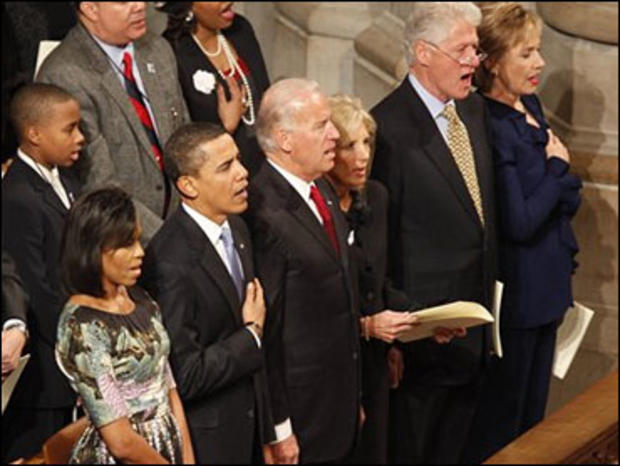National Day of Prayer Deemed Unconstitutional, but Obama Will Recognize it Anyway
Yesterday, a U.S. District Judge in Wisconsin ruled that the annual National Day of Prayer is unconstitutional.
"It goes beyond mere 'acknowledgment' of religion because its sole purpose is to encourage all citizens to engage in prayer, an inherently religious exercise that serves no secular function in this context," wrote Judge Barbara Crabb, who said the Day of Prayer violates the First Amendment's establishment clause, which bans the creation of a "law respecting an establishment of religion" in the Constitution.
Perhaps anticipating the anger that her ruling would create, she also noted there was no law preventing Americans from praying or organizing non-governmental days of prayer, and wrote this: "I understand that many may disagree with that conclusion and some may even view it as a criticism of prayer or those who pray. That is unfortunate. A determination that the government may not endorse a religious message is not a determination that the message itself is harmful, unimportant or undeserving of dissemination."
The National Day of Prayer was established by Congress in 1952, and in 1988 was set as the first Thursday in May. On that day last year, President Obama issued the traditional presidential proclamation, which opened with this line: "Throughout our Nation's history, Americans have come together in moments of great challenge and uncertainty to humble themselves in prayer."
The lawsuit against the National Day of Prayer was brought in Wisconsin by a group of atheists and agnostics called the Freedom From Religion Foundation, which argued that it violated the separation of church and state.
The Obama administration had argued that the National Day of Prayer was legal because it simply acknowledged the role of religion in the United States, according to the Associated Press. But Crabb wrote that "it is because the nature of prayer is so personal and can have such a powerful effect on a community that the government may not use its authority to try to influence an individual's decision whether and when to pray."
Some members of Congress responded negatively to the ruling; House Republican leader John Boehner deemed it "troubling" and urged the Obama administration to appeal. "It violates both well-established legal precedent and the spirit of the principles on which our nation was founded," he said in a statement. A group called the American Center for Law and Justice, which represented more than 30 members of Congress in the lawsuit, also criticized the decision and vowed appeal.
"The decision undermines the values of religious freedom that America was founded upon," said House Judiciary Committee ranking Republican Lamar Smith. "What's next? Declaring the federal holiday for Christmas unconstitutional?"
In a Tweet, the White House said that regardless of the ruling, the president still "intends to recognize a National Day of Prayer." The decision does not ban the president from issuing a proclamation, the White House said.
Last year, the White House did not hold a service at the White House in conjunction with the National Day of Prayer, as President George W. Bush had; the Los Angeles Times described the Bush-era event as "an ecumenical service in the East Room, a big public endorsement of evangelical Christians."
Yesterday, a rumor that the president had "canceled" the National Day of Prayer, tied to that decision from last year, "went viral" online, according to the Examiner.
Said one such claim, according to Snopes.com: "Oh, yes, Obama prays all right. WITH THE MUSLIMS!!"
